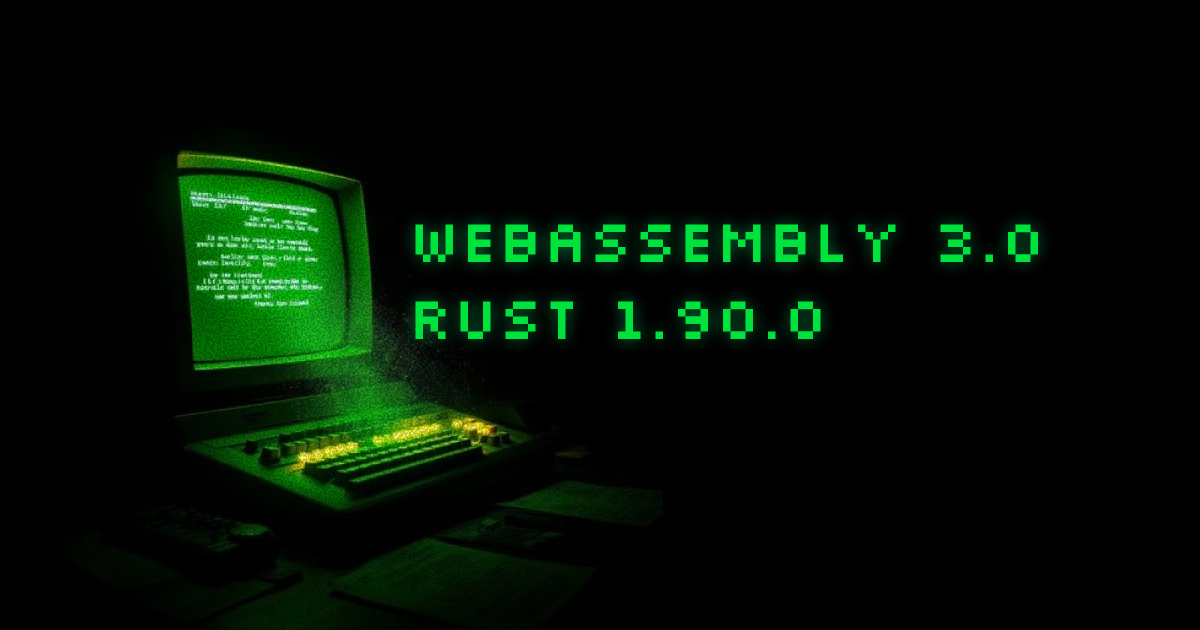The WebAssembly ecosystem has taken a major step forward with its 3.0 release. This update introduces foundational features like 64-bit memory and garbage collection, poised to significantly expand what Rust developers can build on the platform.
With the 4GB memory barrier officially broken and native exception handling now available for panics, will these new primitives solidify Wasm as a go-to target for complex systems outside the browser?
In today’s Rust recap:
> WebAssembly 3.0 adds 64-bit memory and GC
> Rust 1.90 brings faster builds to Linux
> Momento's case study on rewriting from Kotlin to Rust
Wasm's New Era
The Recap: WebAssembly has officially released version 3.0, a significant update introducing foundational features like garbage collection, 64-bit memory, and exception handling that will dramatically expand Rust's capabilities on the platform.
Unpacked:
The new 64-bit address space finally breaks the 4GB memory barrier, allowing Rust applications to handle massive datasets in non-web environments.
While Rust is GC-free, the introduction of low-level garbage collection strengthens the entire ecosystem by enabling languages like Java and Kotlin to target Wasm more effectively.
Rust developers get a major boost from native exception handling, which provides an efficient, portable way to manage panics without resorting to JavaScript-based workarounds.
Bottom line: This release marks Wasm's evolution into a more mature, general-purpose compilation target that moves far beyond the browser. These low-level primitives give Rust developers more power to build safer, faster, and more complex applications that can run anywhere.
Faster Links, Fewer Macs
The Recap: Rust 1.90.0 is out, boosting build speeds for Linux developers by defaulting to the LLD linker while shifting x86_64 macOS support to Tier 2.
Unpacked:
The switch to the LLD linker on Linux can slash end-to-end compilation time by up to 40% for some projects, significantly speeding up development cycles.
Support for x86_64 macOS is now demoted to Tier 2, meaning builds are provided but aren't guaranteed to pass the full test suite over time.
This platform change was prompted by industry shifts, including GitHub's move to discontinue free runners for the architecture.
Bottom line: Faster linking on Linux removes a common friction point, making Rust development even more efficient. The demotion of x86_64 macOS serves as a clear signal for developers to prioritize Apple Silicon for future work.
A High-Stakes Rewrite Pays Off
The Recap: A new case study from Momento details their platform rewrite from Kotlin to Rust, driven by the need to eliminate GC bottlenecks and achieve predictable low latency for their serverless data services.
Unpacked:
The move from Kotlin was a direct response to technical hurdles like garbage collection bottlenecks and multithreaded contention that impacted performance.
Momento builds a real-time data platform with serverless services like caching and message buses, where consistent low latency is a core product requirement.
The primary business goals of the rewrite were to achieve predictable low tail latencies and maximize cost efficiency for their customers.
Bottom line: This move showcases Rust's strength in performance-critical infrastructure where garbage collection pauses are unacceptable. Momento's success provides a compelling data point for other teams evaluating Rust for high-stakes, low-latency systems.
The Shortlist
Ubuntu's transition to Rust Coreutils for its 25.10 release has uncovered several performance regressions, highlighting cases where commands like cksum can run up to 17x slower than their GNU counterparts on large files.
Bevy celebrated its fifth birthday, with project lead Carter Anderson and other community members publishing reflections on the game engine's progress, the state of the official editor, and goals for the coming year.
LanguageTool-Rust released version 3.0 of its grammar and style-checking crate, adding direct support for processing HTML, Markdown, and Typst files and providing an easier-to-use public API.
Obelisk introduced version 0.24.1 of its deterministic WASM workflow engine, adding experimental support for spawning processes and performing disk I/O from within sandboxed activities.
